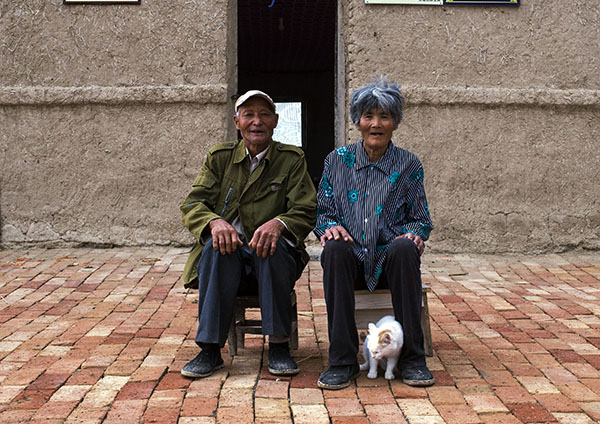An old man and his lonely border patrol
- By Chen Boyuan
 0 Comment(s)
0 Comment(s) Print
Print E-mail China.org.cn, August 4, 2016
E-mail China.org.cn, August 4, 2016
A man suddenly became an Internet celebrity after media reported his five decades spent as a solitary patroller of the no man's land along the border between China and Kazakhstan.
The man's name is Wei Deyou. He and his wife have been living on the Sa'erbulake Prairie in Tacheng of northwest China's Xinjiang Uygur Autonomous Region for 52 years. For the past five decades, he has patrolled the border alone day by day, with sheep as his only companions.
|
|
| Wei Deyou spends five decades as a solitary patroller of the no man's land along the border between China and Kazakhstan. [Photo / Xinhua] |
Wei came to Sa'erbulake in 1964, when the government called on retired servicemen to join the Xinjiang Production and Construction Corps (XPCC) on the prairie where they’d started farming while also guarding the country's frontier.
Sa'erbulake Prairie has stunning scenery as well as extreme weather. Each winter, blizzards from Siberia would bring meter-deep snow, affecting travels for three months of the year. In the summer, gadflies and mosquitos would sting through clothes.
The visible hardship instantly scared off Wei's wife Liu Jinghao when she came to join him from Shandong Province. She insisted on going home immediately; however, touched by Wei's sincerity, she eventually agreed to stay.
While speaking of the anecdote, Liu was still a bit shy. She wanted to chuckle it away, saying: "Now we aren't going anywhere. We will spend our whole life here."
The couple have four children – three daughters and one son. Two daughters and the son have returned to their Shandong hometown and settled down there. Their youngest daughter now lives in another place of the Corp, though still close to the old couple.
Their house doesn't have a number plate, because it is the only adobe house in the 50-square kilometer no man's land. Eight kilometers to the west lies the No. 173 boundary marker between the China-Kazakhstan border.
Wei is more like as a shepherd, and an important task for him is to assist frontier soldiers guard the border.
|
|
| Wei Deyou and his wife have been living on the Sa'erbulake Prairie in Tacheng of northwest China's Xinjiang Uygur Autonomous Region for 52 years. [Photo / Xinhua] |
Shortly afterwards, he headed out to shepherd his sheep, carrying the "three important pieces" – a rusty military kettle, an obsolete radio, and old binoculars. The sandy environment on the prairie has broken 50 radios over the past 52 years. His binoculars are more than 30 years old; they were a gift from a soldier back in the 1980s.
Wei has long been familiar to frontier soldiers and police officers, who benefit from the information he constantly provides. Wei used to come over personally riding a horse to send the reports, but his mobile phone now saves him such trips.
Just one day before, Wei was watching his sheep grazing on a hill when three white vans come dashing toward the border. He instantly called the border control office, which later confirmed them as photographers chasing firebirds.
Such things have happened repeatedly during the past 52 years. Wei said he was familiar with every inch of grass at this feet and every hilltop within sight and that no irregularity could escape his eyes.
The past five decades have silvered his hair and wrinkled his face. Each day, Wei walks along the border for more than 10 kilometers, and the mileage he has accumulated could circle the earth five times. He has dissuaded over one thousand people from illegally crossing the border and helped send back tens of thousands livestock animals.
Speaking of himself, he insisted that he was "just an ordinary person who didn't really do anything big," but confirmed that he will live here patrolling the border as long as he breathes. Many people have asked Wei this same question: "How could you persist in the no man's land for so long? Didn't you ever think of leaving?"
Wei has refused all others' proposals for relocation inland, but would not argue about or explain his reasons. He would just say: "I was sent here to the farm to guard the border, and I will persist until the end. If I leave, who will help frontier guards patrol here?" This is also his answer to why he chose to stay here.
"Only by doing this could I find my heart at ease," he said.








Go to Forum >>0 Comment(s)